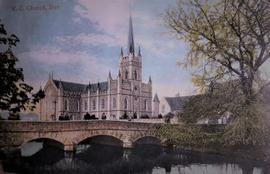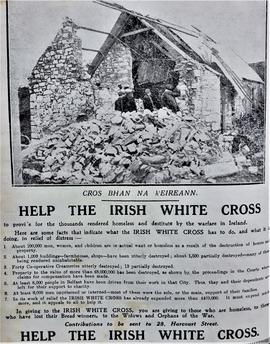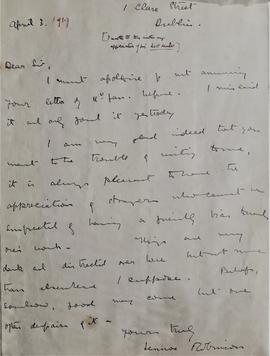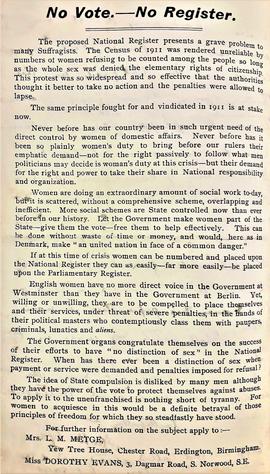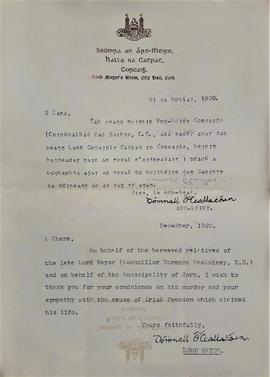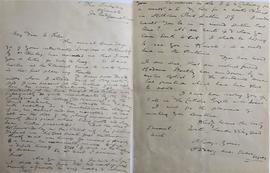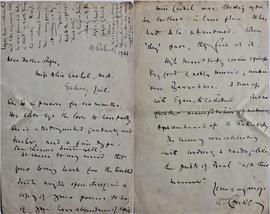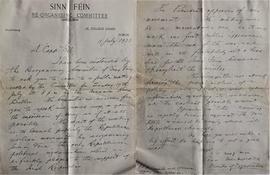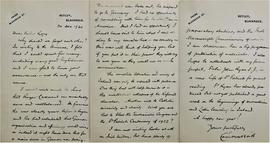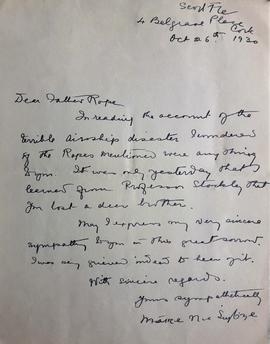A colourized postcard print of St. Brendan’s Catholic Church in Birr in County Offaly.
An advertisement flier for the Irish White Cross which appeared in ‘Ár n-Éire / New Ireland’, a nationalist weekly newspaper, on 14 January 1922. The Irish White Cross was founded in February 1921 as a means of distributing funds raised primarily by the American Committee for Relief in Ireland.
Letter from Lennox Robinson (1886-1958), 1 Clare Street, Dublin, to Fr. Henry Rope. Robinson writes ‘Things are very dark and distracted over here but not more than elsewhere I suppose. Perhaps, somehow, good may come but one often despairs of it’.
A flier supporting the campaign for the enfranchisement of women published by Lillian Metge (1871-1954), a Belfast-born suffragette and women’s rights campaigner.
A printed statement from Domhnall Óg Ó Ceallacháin (Donal O’Callaghan, 1891-1962), Lord Mayor of Cork, expressing his thanks for the expressions of condolences on the death of Terence MacSwiney, his predecessor.
A letter from Fr. Patrick MacSwiney (1885-1940), The Presbytery, Kinsale, County Cork, to Fr. Henry Rope. MacSwiney refers to his recollections of his former teacher, Fr. Michael O'Hickey, (Micheál Ó Hiceadha, 1861-1916), formerly Professor of Irish in St. Patrick's College, Maynooth.
A letter from William Frederick Paul Stockley (1859-1943) to Fr. Henry Rope. Stockley refers to the case of Alice Cashel imprisoned in Galway Jail. Stockley writes ‘She is in prison for six months. He sister says she loves to hear poetry. She is a distinguished graduate, and teacher, and a fine type. She knows Irish well’. Stockley suggests that Father Rope could send her a copy of his poetry.
A letter to William Frederick Paul Stockley (1859-1943) from Conn Mac Murchadha, Director, Sinn Féin Re-organising Committee, 15 College Green, Dublin, re an invitation to attend a public meeting. It is noted that that the ‘object of the meeting is to launch publicly the Republican civilian movement by reorganising Sinn Féin, the only Republican political organisation which is definitely pledged to the support of the Irish Republic’.
A letter from Eoin MacNeill (1867-1945) to Fr. Henry Rope. MacNeill argues that Roger Casement was 'remarkably sane and well balanced' and affirms that he had 'no opportunity of consulting with him' as he was in America when war broke out. MacNeill also refers to his Irish history scholarship and to his work as chairman of the Irish Manuscripts Commission.
Letters from Mary MacSwiney (Máire Nic Shuibhne, 1872-1942) to Fr. Henry Rope. Two of the letters are copies (Rope notes that the copies were made in 1947 and that he deposited the originals in the archives of the Pontifical Irish College in Rome). One of the copy letters (dated 21 Nov. 1922) refers to Mary MacSwiney’s treatment by the Free State authorities. It reads ‘The hardest part of my trial here is being deprived of the Sacraments as I have not succeeded in finding a priest who will be satisfied to hear the confession of my sins and let my political convictions alone’. The original letter (26 Oct. 1930) refers to the ‘terrible airship disaster’ involving R 101, a British rigid airship. The disaster claimed the lives of forty-eight of the fifty-four people on board including Fr. Henry Rope’s younger brother, Squadron Leader Frederick Michael Rope.
